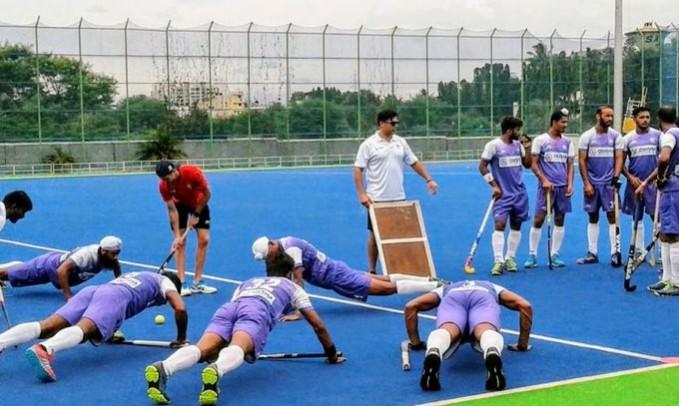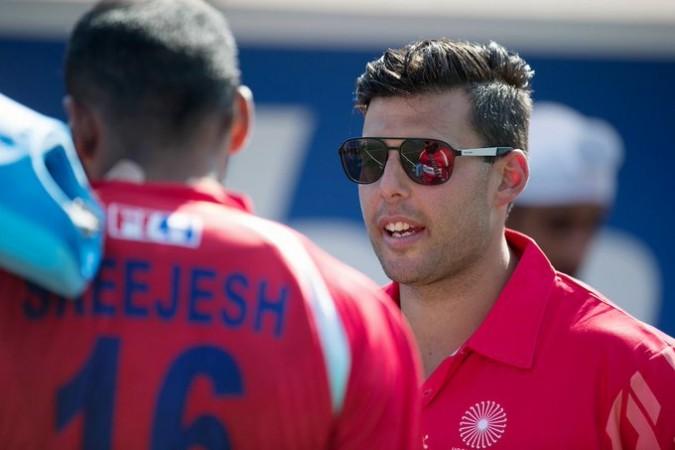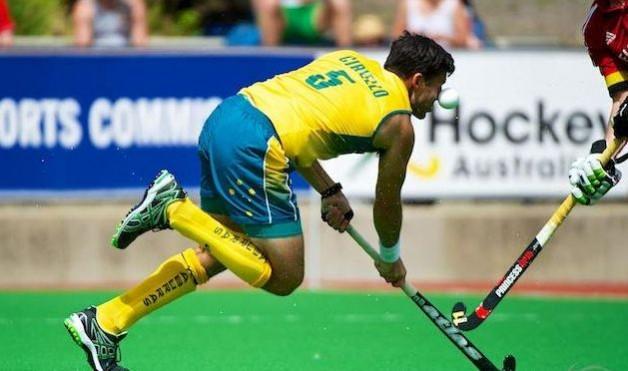
One thing that Indian hockey fans cannot complain about is the quality of the support staff arranged for the men's team. It includes, apart from coach Graham Reid, former Australian international Chris Ciriello. Member of the 2014 World Cup winning team, Chris was known for his powerful physique and brilliance as a drag flicker.
Now with the Indian team in the capacity of analytical coach, he is overseeing their all-round improvement and trying to get them prepared for reaching the next level of success. In an exclusive interview with Akshay Saraswat of International Business Times, India, the 'Big Dog,' as he was called by his teammates, talks about his role in the team as well as other aspects of his professional career.
You were one of the most muscular players in your playing day. How important is that aspect in a modern hockey player's overall personality?
I think, because I was stronger, I had limited injuries in drag flicking. So, a lot of people think drag-flicking is easy. But when you do the same training as everyone else and when everyone's tired, then you have to flick 300-400 balls on top of what everyone else has done, you become extremely tired and have different areas of stress on your body.
So, I used the skill I had. I was bigger and stronger whereas other guys who are smaller turn faster. I think whatever skill you have, you have to be able to use. That definitely helped me with the flick. And I had up to six different types of drag flick. Depending on the goalkeeper, you can change the style of flick so they wouldn't understand what you were going to do.

When it comes to your association with the Indian team, what role do you play while working with the side?
My role is that of the analysing coach. So, it's not drag-flicking coach like everyone thinks. It's just something extra I do. When I go with the team, I am also the manager. So, I organise all the stuff with the FIH. But in regards to the pitch, I am assistant coach as well.
Currently, we are looking at the structure we have with the ball and without the ball. For me, I like and we are starting to look at, how our strikers get into the circle. The pattern in which they move and other stuff.
Now that we are moving towards the 2020 Olympics, how do you rate India's chances in that event?
My biggest focus is qualifying. The big focus is knowing who you are going to play. Then, putting together good analysis of players of those teams so that there is an understanding of what they are. We also need to get all the players to understand that.
And what about the chances of your native team Australia?
I think everyone will try to peak. I think they will be good because they would have experienced, by then, two Pro Leagues. We (Indian team) went over and played with them with a mixed team. Some guys debuted.
They (Australia) were pretty sharp. The two Tests were tough games. But these guys (Australian team) have played against the top-8 teams in the world, travelling around the world. So, they are already, what I call, match fit. I think, coming to the Olympics, they will be pretty sharp. Everyone wants to win that Gold.

What made you choose India as the place to be a coach?
They contacted me. I have coached since I was 18 years old. I have been director, hockey and have coached first division clubs, men's and women's. I have had my own academy for more than 10 years with my father. We also have a hockey shop in Melbourne.
It was also a bit of an interesting role because I am half-Indian. My mother was born in Kolkata and my grandfather played here with guys like Balbeer Singh. I said when I was 15 years old that I will come here and coach in India.
Did you predict that or was it a dream?
Bit of both. But I saw that there would be an opportunity eventually.
In the 2014 World Cup, which your side won, you and Gonzalo Peillat were the two most prolific scorers from penalty-corners. Did you see yourself in a rivalry with Peillat?
No, not really. I have always said that I was a field hockey player and then a drag flicker. So, drag flicking was an add on to being a good hockey player. For us in Australia, it was about being selected. If you weren't a good hockey player, then, they can't hide you. For being the best in the world, you need to be a good hockey player, as well as be able to execute all the other skills.
What made that Australian team so good? At that time, it seemed even a rest of the world XI with the best players from all the other teams can't defeat your side.
Just the output of the guys. The energy, the drive to wanna win. That's something I am trying to bring to other guys – understanding that every session, you have to come with the desire to win. And so the difference is that if you want to win, you drive really hard at training. And so, when the training was there, it was three times harder than the World Cup games.

Even though the Australian team is still doing well and have won the FIH Pro League recently, they don't seem as ruthless as before, especially when it comes to goal-scoring. Is that something you feel has gone missing in that side?
I think they are a good team. I think they have got quite a few good players. They are also young and re-developing after losing quite a few older guys. So, I think they will be really good.
The thing is, when I came through, I was with guys who had played at Athens Olympics in 2004 and had won the gold medal. So, they knew how to and wanted to win. The older guys really drive the younger guys. And there are not as many older guys in the current Australian team. So, I think, as long as they are training hard, they will still be a very good team.
You played under Ric Charlesworth when he was the coach of Australian team. Now the side is being managed by Colin Batch. How different are the two personalities?
I know Colin well. When I first played with Barry Dancer, (Australian coach) for Australia, in 2008, he was the assistant coach. So, I spent couple of years with Colin. He is more of a reserved guy but very smart and has worked in Belgium and New Zealand. He has been pretty good for our country also. So, Australia are happy to have him.
To be more specific, he is a bit more calm and relaxed than Ric. Ric is very much about attention to detail. Graham Reid is a bit more about philosophy and is more encouraging than the other two. They do all have their different styles.
I think Barry Dancer also worked with Colin Batch. You kind of grow with the people and have your own style and then, they, sort of, influence the way you coach. Ric was very intense guy and also knew how to get the best out of guys and push them.

The current Belgian team (world champions) seem to be playing in a style similar to your Australian team. Do you also think they are playing like you guys did?
Yes, I think that's because Adam Commens, who was Australian women's team coach, is their high-performance director. Colin Batch was there before. So, they have had a lot of Australian influence coming through.
With the Belgian team, they have been together for a long time. So, those guys have played, probably, 100-150 plus games together. What they have done is develop good structure together and they have a good understanding. Also, because they are competitive amongst themselves, they have taken the next step.
I think what was really important for them was to win the last World Cup. That was a big step. That's because, for a lot of the time, they were in and around and up and down, like the way the Indian team has been for a little while. Second, third, second, third, fourth, whatever. Belgium did that for probably 2-3 years.
We didn't often get beaten by Belgium at all. There was one occasion in Rotterdam when (Vincent) Vanasch saved a shootout shot against me. Thanks to him, they won that tournament. But it wasn't a major event. I think the building of the Belgium team is really important. They have, definitely, further developed because they have been together for such a long time.
There is a new league coming up in Australia called Hockey One. What are your thoughts about it?
Yes, I think it's pretty good. What they are trying to do is probably replicate the Big Bash sort of a tournament. I played the last two editions of the Australian Hockey League when we won those with Victoria. So, I think what they are trying to do is make it more like a franchise-based tournament and get more following and merchandise and really, support the players. I am always happy with something new as long as they are looking after the players.














